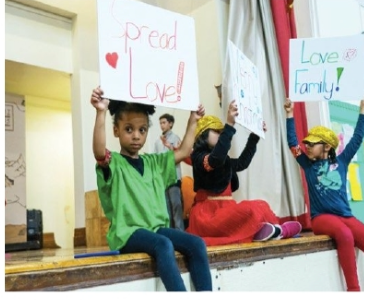|
What Leaders Must Do to Ensure Building Culturally Responsive Afterschool Programs by Lissette Castillo  Photo by Lisette Castillo Photo by Lisette Castillo By definition, “culturally responsive” education must, among other things, “use the cultural knowledge, prior experiences, frames of reference, and performance styles of ethnically diverse students to make learning encounters more relevant to and effective for them.” In addition, “challenging racial and cultural stereotypes, prejudices, racism and other forms of … oppression” is a defining element of the term, coined by Dr. Geneva Gay. Considering the current chaotic state of our nation, the miseducation of children of color and the widening opportunity gap—often erroneously called the achievement gap—it’s time to eradicate the consistent and oppressive structures of racism in educational programs. Students of African and/or Indigenous descent (DAIP) deserve programs exhibiting a range of practices that honor their identities, linguistic assets and cultures—in addition to de-centering whiteness from our learning spaces and collective learning, and grounding that is centered within the context of culture and race. Noting what occurred at the U. S. Capitol in January, we need our local officials, district leaders and partners to work in unison to address the immediate needs of communities of color by providing us with safe spaces where our authentic, whole selves are protected and nourished, and our presence, histories and realities are affirmed. All of us need to be committed to understanding, challenging, and fighting racial inequalities in our partnerships and OST programming through developing curriculum, programming and learning/working spaces where DAIP children and staff can finally thrive. Some organizations’ unwillingness to deeply examine their cultures and practices through an anti-racist lens poses challenges for our children to succeed and makes it difficult for staff to bring their best selves forward in service of youth. We desperately need a culture shift in learning spaces that supports pedagogy, curriculum, programming and training for DAIP staff with responsiveness and compassion that serves to heal our communities. OST frontline staff are pillars in cultivating the intellectual curiosity and well-being of DAIP children. To purposefully fund transformative OST experiences, funders and grant makers must do more to understand the intricacies of student and staff identities and demographics. The process through which OST programs with districts receive funds should emphasize that organizations exhibit culturally responsive programming and demographically representative staff. As a leader in NAA’s Professional Learning Community for Emerging Leaders of Color, I’ve witnessed how transformative organizational change demands that leaders provide inclusive working spaces wherein professionals of color can engage their work through a critical race lens and build meaningful connections with other colleagues of color through collective sense-making. Leaders have a responsibility to lead with transparency, empathy and a keen understanding of community needs. The only way forward is for leaders to listen, acknowledge educational inequalities, and restructure our children’s learning and play spaces by dismantling ableism and oppressive educational systems through their institutional cultures, policies, programming and practices. As children re-enter schools and families’ needs for OST support increases, school districts, organizations and funders have an opportunity and responsibility to reimagine programming and staff training. Pre-pandemic inequities, and now COVID-19, have exacerbated and widened the opportunity gap. As we attempt to recover, OST agencies and districts must develop culturally responsive strategies to rebuild healthy working and learning spaces for social transformation. We need to identify the most vulnerable and marginalized groups of children and identify culturally responsive mechanisms to support their learning and enrichment opportunities. We need compassionate leaders who listen to community needs. We do not need “experts.” We need people who see the humanity of others; who see children as their own. We do not need “white saviors.” We do not need or want DAIP people who think they have nothing to learn. Instead, we need leaders to do internal audits of themselves for biases and prejudices before they ever attempt to lead anyone else. The pandemic has unquestionably displayed the racial inequities in our learning communities and will continue to intensify the racial and economic disparities already disproportionately affecting our communities. We must rebuild real culturally responsive OST programming and partnerships which address the racial and ethnic disparities in all educational spaces. Lissette Castillo is Director of Amigos Community School for the City of Cambridge, Massachusetts and Managing Director of Professional Learning for The BlackPrint Inc. Castillo is an NAA Executive member and a member of NAA’s Emerging Leaders of Color 2019-2020 cohort. She has a steadfast commitment to the liberation and self-determination of African and Indigenous peoples and is zealous about challenging and fighting racial inequalities in education in part through the development of culturally responsive curricula and programming that are family- and youth-driven. This article was first published in the digital edition of Afterschool Today, The Official Publication of the National Afterschool Association, Spring 2021. www.naaweb.org If you'd like to share resources with your colleagues, tell us how you are coping and healing, and helping the youth and families that you work with to heal, and continuing to find joy while we are physically apart, please submit a blog post by emailing. Here are some tips to help get you started.
0 Comments
Leave a Reply. |
Archives
March 2024
Categories
All
|
|
Looking for something?
|
|
